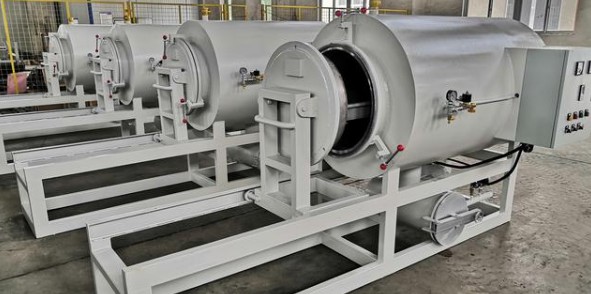The mask non-woven fabric is made of polymer chips with high melt index, which are extruded and heated and melted into a high-temperature melt with good fluidity. The melt will be sprayed from the spinneret using high-temperature and high-speed hot airflow. A production process in which the thin stream is blown into very fine fibers, gathered into a fiber web on a receiving device (such as a web forming machine), and bonded to each other to form a cloth using its own waste heat. However, the spinneret using the melt blown wire is easy to be blocked, which affects the quality of the melt blown cloth.
What should I do if the spinneret is blocked? There are actually many ways to clean the plugging of the spinneret, but the one that has little effect on the material of the spinneret is the vacuum high-temperature calcination cleaning. This method effectively avoids the damage and oxidation of the metallographic structure of the workpiece, and keeps the workpiece in good condition. Metallic luster. Next, we will introduce the vacuum high temperature calcination cleaning equipment of the spinneret-vacuum cleaning furnace.

1. Composition of vacuum cleaning furnace
The vacuum cleaning furnace is mainly composed of a vacuum sealed furnace, a stainless steel electric heating tube heater, a waste collection tank, water, a water ring vacuum pump, a workpiece hanging basket, and a temperature automatic program control system for it, a vacuum pump automatic opening and closing system, and water circuits, instruments, etc. composition.
2. Working principle of vacuum cleaning furnace
The vacuum cleaning furnace uses plastic chemical fiber polymer polymer to melt at about 300℃, and can crack and coking by isolating air above 300℃, and produce a variety of cracked products. Above 400℃, under the condition of a small amount of oxygen and a certain degree of vacuum It can be completely oxidized. Using this feature, first heat the workpiece to about 300°C, so that more polymer on the surface of the workpiece melts and flows into the waste collection tank at the bottom, leaving only a small amount of polymer and ash in the micropores on the workpiece surface At this time, the furnace temperature is raised to 400~500℃ (the temperature can be determined according to the process requirements), and the vacuum pump is turned on, and a small amount of air is introduced to fully oxidize the remaining high molecular polymer to generate carbon dioxide and water. The ash and water vapor floating in the furnace are sprayed and washed by the water spray scrubber and then taken out of the furnace and taken away by the water. During the whole working process, no polluting gas, smoke and ash are discharged indoors, even if they are discharged outdoors, only a small amount Carbon dioxide, the ash taken away from the water is also very small.
Three, the characteristics of vacuum cleaning furnace equipment
1. The vacuum cleaning furnace adopts high temperature resistant sealing ring and does not need water cooling protection. Therefore, the equipment has low heating power, high thermal efficiency, fast heating speed, good temperature uniformity, and convenient heater inspection and maintenance, which is more convenient than external heating The heater saves a lot of electricity and water, and overcomes the disadvantages of poor temperature uniformity in the furnace due to water cooling and poor local cleaning effects.
2. Integrated design of electromechanical instrument, convenient installation. The furnace body is integrated with the control cabinet, which reduces the equipment area and simplifies the on-site installation workload of the equipment. The volumetric equipment using industrial elevators can be easily installed at designated locations without destroying existing buildings.
3. The equipment has complete automatic working performance. As long as the programmed working procedure is input to the program temperature controller, the equipment can perform automatic cleaning work without manual intervention in the middle, and has the alarm function of over-temperature, lack of items and water cut or low water pressure. .
 Back Home
Back Home Bookmark
Bookmark
